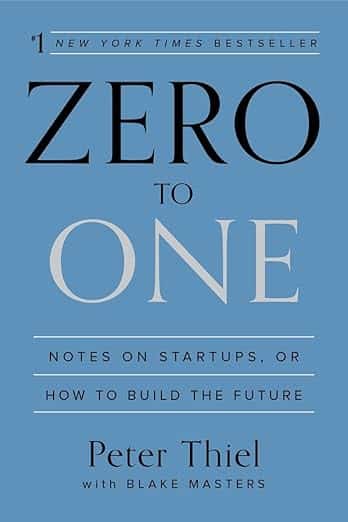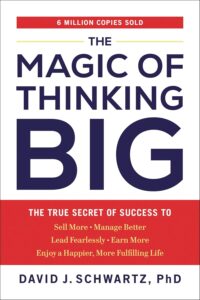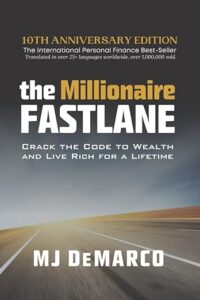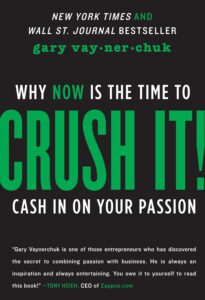Book in 3 Points
- Build Monopolies, Not Competitors: Successful companies solve unique problems and dominate small markets before expanding—aim for 100% of a $1 billion market rather than 1% of a $100 billion market
- Think 10x, Not 10%: Your product must be at least 10 times better than existing solutions to escape competition—PayPal eliminated weeks of check processing, Amazon offered 10x more books than any bookstore
- Focus on Exponential Returns: The best investment in a successful portfolio equals or outperforms all others combined—whether starting a company or joining one, only pursue opportunities with massive scaling potential
How do you create something that has an impact? The next Facebook, Uber, or Paypal? Luckily, the creator of Paypal, Peter Thiel, has written a fantastic book on doing just that – on how to build the future. In Zero to One, Peter outlines several lessons every successful business should be aware of. I have reread this book three times now and feel the information in it is invaluable.
In this post, I summarize my biggest take-aways from Thiel’s excellent startup manifesto, Zero To One.
A great company is a conspiracy to change the world
1. You Want to Be a Monopoly
All happy companies are different: each one earns a monopoly by solving a unique problem. All failed companies are the same: they failed to escape competition
Here we see the first mention of going from 0 to 1, and it makes sense. Google is amazingly successful because it is THE search engine. In May of 2014, it owned 68% of the search market, with the closest competitors being at 19 and 10%. As of February 2022, according to gs.statcounter.com, google has 92.01% of the search engine market share worldwide. Do you think Google has a monopoly on the search engine market? I think it does. However, Google doesn’t frame itself like that as monopolies are classically frowned upon, so it is also an advertising agency, where it only has 3.4% (in 2014) of the global market. Finally, it is also a technology company making phones and cars, where it is only 0.24% (in 2014) of the market. So it’s not a monopoly, right?
The companies that are struggling are indeed non-monopolies. Most new restaurants fail; no your grandmother’s recipe is not that different.
Non-monopolists exaggerate their distinction by defining their market as the intersection of various smaller markets, such as a restaurant saying they are a British food restaurant that’s also in Palo Alto that also offers outdoor terrace seating. At the same time, monopolists disguise their monopoly by framing their market as the union of several markets. Google is involved in the search engine market and the advertising, mobile phone, and computer market.
A competitive equilibrium is 19th-century physics, old news. “Monopoly is the condition of every successful business.”
Peter Thiel argues competition is actually harmful to most, especially in academia. Elite students climb confidently until, eventually and inevitably, they are beaten. Companies compete, being virtually similar in many ways, only being dominated by a superior monopoly. Before Apple, Microsoft and Google battled over software, tablets, and more. In 2013 Apple was surpassed them both, combined (today, Apple is worth 2.68 Trillion while Google is worth 1.8T and Microsoft is worth 2.25T). If you can’t beat a rival, it is better to merge. The author describes Elon Musk as nearly destroying PayPal with his similar company X.com; Peter Thiel and Musk merged 50-50 and survived the dot com crash, unlike thousands of other companies.
2. What Monopoly Should You Build?
Peter Thiel advises us to first-off, focus on long-term growth. Remember Zynga? Farmville? Yeah, gone. However, Linkedln is still around, Paypal is still around, Twitter is still around. These companies have something in common; they answered the question, “Will we still be relevant in 10 years?”
What important truth to very few people agree with you on?
How to Stay Relevant
How will your company be relevant in 10 years? Importantly, this isn’t a quantitative question; this is a qualitative question. Thiel outlines four business characteristics that can help a business stay relevant:
- Proprietary Technology: (Incoming my favorite principle of the entire book) You must be ten times better (at least). Anything less than an order of magnitude better will likely be perceived as a marginal improvement and, bam, you have competition, bam, no monopoly for you. The most straightforward way to do this is to create something new, like curing baldness or eliminating the need for sleep. To 10x, you really need to 10x; when PayPal first came out, it eliminated the need for eBay sellers to mail and receive checks. That’s a 100x improvement, in my opinion. Amazon offered 10x as many books as any other bookstore when they opened their online bookstore. Apple released the iPad, revolutionizing the “tablet.”
- Network Effects: These products become more valuable as more people use them. Think of Facebook, Instagram, Uber.
- Economies of Scale: This is why you should sell information instead of a physical product. If I create a website that teaches Yoga via online classes, my potential is limitless. However, if I start a Yoga studio, I need to hire instructors, rent studios, and, even then, each of my studios is limited to a certain number of people.
- Branding: Think Apple. Apple is a powerful brand, and when you think of Apple, you think of sleek design, fantastic consumer experience, and high prices.
Start Small but Monopolize
PayPal initially tried to allow people with Palm Pilots to beam money to each other. However, people with PalmPilots weren’t using PalmPilots to beam money to each other. So, it failed. PayPal had a monopoly and were doing something cool, except no one cared. The next target, however, was a success. The next target was eBay. PayPal were the only people allowing this money exchange over the internet, and people needed it.
A perfect target is a small group of particular people concentrated together and served by few or no competitors. Try to get 100% of a $1 billion market instead of 1% of a $100 billion market. Remember, avoid competition unless you are going to seriously smash them.
Peter Thiel lists seven questions every successful business must answer and uses Tesla as an example of a company that did this well.
Seven Questions Every Business Should Answer
- Engineering: Can you create breakthrough technology instead of incremental improvements?
- Tesla has technology that is so good, that other car companies buy their car parts from Tesla (Honda, Ford, etc.).
- Timing: Is now the right time to start your particular business?
- In January 2010, when the Obama administration emphasized renewable energy, Tesla secured a $465 million loan from the U.S. Department of energy. That would not happen today.
- Monopoly: Are you starting with a big share of a small market?
- Tesla began with a tiny market, the Roadster in 2008 only sold 3,000 cars. They began as, really, the only electronic car company in the US.
- People: Do you have the right team?
- Elon Musk is a smart technical guy and businessman, he describes his team, “If you’re at Tesla, you’re choosing to be at the equivalent of Special Forces. There’s a regular army, and that’s fine, but if you are working at Tesla, you’re choosing to step up your game.”
- Distribution: Do you have a way to not just create but deliver your product?
- Tesla started their own distribution chain. Unlike other car companies, Tesla sells its cars at its own dealership. They don’t depend on independent dealerships to give the “tesla” experience. The cost is higher, but the reward is greater and saves the company money in the long term.
- Durability: Will your market position be defensible 10 and 20 years into the future?
- It seems cars will be essential in the foreseeable future, and electronic cars even more so. Also, unlike every other car company, the founder of Tesla is still in charge.
- Secret: Have you identified a unique opportunity that others don’t see?
- Tesla makes cars that look cool and also lets people appear to be participating in “cleantech.” Tesla has a unique brand that is multiplied by the social phenomenon of people wanting to appear environmentally conscious.
Once you dominate the small market, expand.
Look at Amazon; they started with books. Next, they went to CDs, videos, and software (a similar market). You can bet your butt they dominated CDs before moving onto videos, and dominated videos before moving onto software, and so on.
eBay started with niche auction markets like people obsessed with Beanie Baby’s. The small market niche doesn’t define you, just as it didn’t define eBay or Amazon. But, your ability to dominate the small market, does.
Don’t Challenge a Large Competitor, you both will lose
PayPal was successful because they didn’t compete with anyone when they first were created. They created a novel way for payments to be sent online when they saw a problem. Don’t disrupt, avoid competition as much as possible. Have a long-term vision of revolutionizing your small market. Create your monopoly and move forward.
3. The Logistics of Building Your Monopoly
Early Decisions Matter
The most crucial decision is who you start your business with. When top investors invest in a company, they not only focus on what the company does, but, they focus heavily on who the founders are of the company and how they work.
Important questions to answer when you are starting:
- Ownership: Who legally owns the company’s equity?
- Possession: who runs the company on a day-today basis?
- Control: who formally governs the company’s affairs?
When you build your company you need a board, a group of people making crucial decisions for the company. Who is going to be in the boardroom is one of the most important decisions that will be made, Peter Thiel argues less is more; the fewer members the better. Thiel says a board of three is ideal and the total number of board members should never exceed five.
Stick Together
Thiel also argues, going against what seems to be the norm, everyone on the team needs to be full-time, and everyone needs to be in the same place every day. I am not sure if I agree with this, especially if you need an outside lawyer or accountant part-time; however, I see the importance of key members being together, in person, every day.
How much should the CEO be paid?
According to Peter, a company does better the less its CEO is paid.
In no case should a CEO of an early-stage venture-backed startup receive more than $150,000 per year in salary.
A high-payed CEO is incentivized to keep the status quo, while a cash-poor CEO will focus on increasing the company’s value as a whole. Notably, a low-paid CEO also sets the standard for everyone else; many CEOs even take the lowest salary in the company.
How to Hire
Talented people don’t need to work for you; they have plenty of options.
So, where does the money incentive come from? The big returns? If you believe in the company, high returns come from part ownership of the company. This is how top employees can join your venture, your dream, without crazy salaries. They will join because they believe in the company and believe working with you will create exponential returns from the equity you provide them. Importantly, Thiel argues to keep the specific details of employees’ individual ownership a secret. A feeling of unfair distribution of company ownership could anger and jealousy between employees.
Also, equity vs. high salaries is an important deciding tool on whom to hire. Anyone who prefers to own part of your company versus being paid cash reveals a preference for the long term and commitment to increasing your company’s value in the future.
Beyond that, the main reason someone joins your company should not be compensation; it should be because they are aligned with your team’s mission and are compatible.
4. The Culture of Your Monopoly; Your Conspiracy to Change the World
What would the ideal company culture look like? This is your time, your dream world, where you can really go crazy. I would want to be at a company where I enjoy being at the office so much that formal business hours aren’t even a thing, and nobody watches the clock at all.
Thiel feels workspace should be open, not cubicled, and workers should feel at home (he likes beanbag chairs and ping-pong tables, free massages, yoga classes, on-site sushi chefs… you get the idea.)
Importantly, no matter how attractive your office life is, none of it will work if the company and the team aren’t established together working towards the company’s mission. You are a sports team going into the final match, a naval squad diving into enemy territory, a team that’s going to change the world.
When developing roles for employees, it is vital to establish a specific and unique position for every person. This is important for two reasons; one, the employee knows this is the one thing they are doing, and no one else will do it for them. Two, everyone in the company knows how they will be evaluated; they will be evaluated by this specific one thing, their role in the company.
5. Exponential Growth is Necessary
Money makes money.
Albert Einstein relays compound interest as the “eighth world wonder.” Exponential increases are the norm, not the exception, in successful companies. Think about the Pareto principle, a principle developed by an economist in 1906, named Vilfredo Pareto, when he discovered that 20% of the people in Italy owned 80% of the land. Vilfredo relayed this was as normal as the fact that 20% of the peapods in his garden generated 80% of the peas.
The Secret of Successful VCs
If you don’t know what venture capitalists are, they are a group of people that aim to identify, fund, and profit from promising early-stage companies. When the companies they invest in, hopefully, become successful, they take a cut of the returns (usually 20%). However, when the company fails, that money, that investment, is gone. Most venture-backed companies fail, but good VCs know that.
Peter Thiel argues that this is the difference between a good VC and a bad VC; the error in bad VCs comes in that they expect a normal distribution of venture returns. Where bad companies fail, medium ones stay flat, and good ones return 2-4x. Hopefully, the winners will counterbalance the losers.
The successful VCs follow the power rule and exponential growth; they realize venture returns don’t follow a normal distribution at all. A small handful of companies will dramatically outperform all others.
The biggest secret in venture capital is that the best investment in a successful fund equals or outperforms the entire rest of the fund combined
So, using these ideas, Thiel’s rule for VCs would be these:
- Only invest in companies that have the potential to return the value of the entire fund
- Follow no other rules
Investors must find a handful of companies that will go from 0 to 1 and then back them with every resource. This, of course, is the difficulty in VC funds; however, “every single company in a good portfolio must have the potential to succeed at a vast scale.” Peter Thiel’s VC fund focuses on five to seven companies that they think could become multibillion-dollar businesses.
These venture investments have a considerable impact; venture companies generate 11% of all private-sector jobs and generate annual revenue equal to 21% of the GDP; the twelve largest tech companies were all venture-backed, worth more than $2 trillion, which is more than all other tech companies combined. The exponential rule wins.
Where to Get Exponential
Diversity is not encouraged in VCs; it doesn’t make sense. The only chance you have at winning, versus the entire rest of the world, is having specific knowledge on a field, so you know what companies are more likely to be successful. This is not the American school system; homogenized, generic intelligence is no Bueno.
You should focus relentlessly on something you’re good at doing, but before that you must think hard about whether it will be valuable in the future.
Notably, Peter Thiel mentions that creating your own company, your own startup, may not be the past path to exponential growth (even though that’s what this entire book is about). You can become tremendously successful by joining a startup on the rise if your trained insight reveals that this is the best company to join. If the company fails, you can join another company. However, if you fully fund your own startup company, 100% equity of zero is zero. For example, owning just 0.01% of Google is equal to 175 million dollars as of writing this post.
If you do start your own startup, remember the essential rules of this book: one market is better than all others, one distribution strategy dominates all others, time and exponential growth matter (a lot). There are still secrets out there, still problems to be solved, go solve them.
Our task today is to find singular ways to create new things that will make the future not just different, but better-to go from 0 to 1. The essential first step is to think for yourself. Only by seeing our world anew, as fresh and strange as it was to the ancients who saw it first, can we both re-create it and preserve it for the future.
Thanks for reading! I hope this was inspirational, get out there and change the world (and your life).
-Zach




